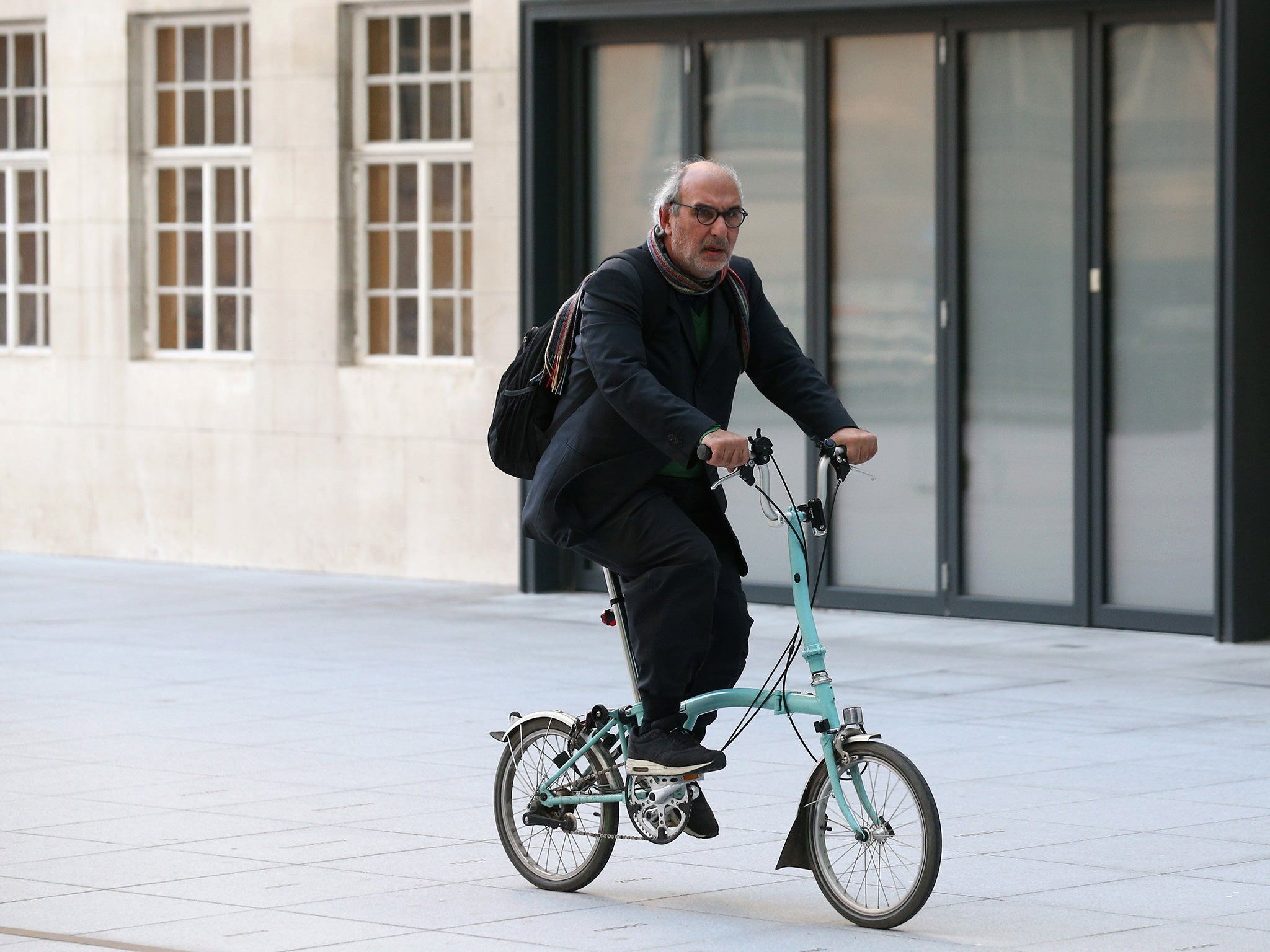Too-nice Yentob was putty in the hands of Batmanghelidjh, now he’s paying the price
Kids Company had come to dominate Alan’s life, and now it’s cost him a lucrative job


A friend tells me Alan Yentob has been seen carrying around a large bag of documents about the internal workings of Kids Company, the controversial charity he chaired until its recent closure, desperately seeking to discuss the “true story” at every opportunity with a close circle of pals. Kids Company had come to dominate Alan’s life, and now it’s cost him a lucrative job.
His decision to step down as the BBC’s creative director at the end of the month was surely precipitated by the announcement that the BBC Trust planned to investigate whether he tried to influence the reporting of events surrounding the collapse of Kids Company. Allegations that the charity mishandled millions of pounds in government and private donations resulted in Yentob making two appearances in front of a parliamentary committee to clarify matters. He was placed in an appalling position, clearly discomfited by the antics of the charity’s founder Camila Batmanghelidjh, who in turn seemed outraged that she had to account for herself and how she had spent millions of pounds of taxpayers’ money.
Did the furore surrounding Kids Company reflect badly on the BBC? Hardly. The decision to ease Alan out of his role as creative director seems unfair, to say the least. If he did ring Newsnight and speak to Radio 4’s Today programme, and even if there was any attempt to “influence”, he wouldn’t be the first BBC executive to “lean” on journalists – subtle “pressure” has been going on for years. As a BBC executive I remember getting a bollocking from the head of television because I’d greenlit comedian Denis Leary’s bleak routine about throat cancer (joking that a tracheotomy allowed him to smoke two cigarettes at once) on a late-night BBC2 show – because a senior executive had been diagnosed with throat cancer. I was told that not only was this routine in poor taste, but that such subject matter should be run by “editorial policy” in the planning stage.
There are endless examples of BBC executives trying to control editorial content. Have we forgotten the Jimmy Savile saga already? Then there’s Steve Hewlett. The respected presenter of Radio 4’s The Media Show – a former editor of Panorama and BBC2’s Inside Story and who authored the recent BBC2 documentary series Reinventing the Royals – is a long-standing BBC insider, yet he is expected to report on the corporation in a neutral fashion. Is that possible?
Ironically, if Alan Yentob is suited to any job, it is as a creative director who is passionate about the arts. But he was completely unsuited to be chair of a charity run by a charismatic and difficult woman. Put simply, he’s too nice and was like putty in her hands. That charity needed a board asking tough questions, and should have constrained its founder, channelling her talents into areas it could control.
Alan, however well meaning, wasn’t up to the job. He’s a brilliant programme-maker (although there have been complaints that the latest series of his arts programme Imagine doesn’t feature a single woman). He’s a terminal name-dropper. But there is no doubting his utter honesty and commitment. Yes, he’s middle class and lives in a tiny, precious world of luvvies. But I can’t help feeling that, on this occasion, he’s been treated unfairly.
The take-your-wife-to-work trend can take a hike
The annual “Take your daughter to work day” was dreamt up to encourage girls to aim higher, but a senior French politician has decided to go one further. The economy minister, Emmanuel Macron, has given his (unelected) wife a key role in strategy meetings, claiming “her opinion counts… and she brings a change of atmosphere… you don’t work well when you are not happy”.
Their marriage is unusual: Brigitte is a former schoolteacher, 19 years older than her husband and used to teach him when he was a sixth-former. I’ve been married to older and younger men, but I wouldn’t want them in the office. In fact, going to work was a fantastic escape from hearing all about their “problems”.
There are quite a few examples of politicians using wives as “special” advisers – Hillary and Bill Clinton, and now the Obamas. In France, Nicolas Sarkozy was derided when he appointed his wife, Carla Bruni, a former model, to an unpaid role.
Thankfully, there are few signs of this happening in the UK. I might complain about political wives being used as arm candy at conference time, but neither Mrs Corbyn nor Mrs Cameron feel the need to validate themselves through their husbands and I admire them for that. Mr Macron ought to get out a bit more; there are plenty of highly intelligent advisers in France who have gained their place at the table through that old-fashioned process known as the ballot box.
A princely lesson in trying to control the media
Prince Charles is keen to let politicians of all parties know his opinions on his pet causes, from architectural monstrosities to the plight of poorly paid farm workers, sending handwritten missives in black ink designed to go straight to the top of the ministerial in-tray.
After a 10-year legal battle costing more than £400,000 and involving 16 judges, 27 of these “black spider memos” were finally published in May this year. The contents were deemed to be harmless, even “boring”, according to The Washington Post. They reveal Charles as a frustrated meddler, determined to get his opinions heard by those in power.
Free speech is a fundamental part of the British way of life; it is sacrosanct. So it’s ironic that our future king’s media advisers have decided to exercise total control over any broadcast interviews he might grant. A 15-page contract has been drawn up, which has to be signed before negotiations commence, insisting that all questions are agreed in advance, and his people have the right to intervene in the editing process and view the final version prior to transmission. In the event of a disagreement, the Prince could veto the interview being shown.
I can think of no politician or pop star who can be arsed to go to such lengths to have themselves portrayed in a flattering light. It places Prince Charles on a ranking with North Korea’s Kim Jong-un. Channel 4 has refused to comply, cancelling an interview with the Prince at the climate conference in Paris, and I expect other media outlets to follow suit.
The dish of the day taken with a pinch of salt
How to take the pleasure out of eating - New York has become the first city in the US to make it a legal requirement for restaurants with more than 15 outlets to display the salt content of meals on a menu. Failure to do so will result in a fine of $200.
The signs used are gloomy black triangles, printed next to any dish containing more than the daily safe allowance of sodium, 2,300mg, and have to have the same size as the largest letter in the description. Calorie contents already have to be displayed by law on all restaurant menus, although I wonder how they are calculated.
Do you really care about salt levels if you’ve decided to pig out and go for a bucket of deep-fried chicken? Logically, the next step is to devise a warning symbol for sugar. At this rate most restaurant menus will look like the Highway Code.



Join our commenting forum
Join thought-provoking conversations, follow other Independent readers and see their replies